Nutmeg: Magical use to treat digestive disorders
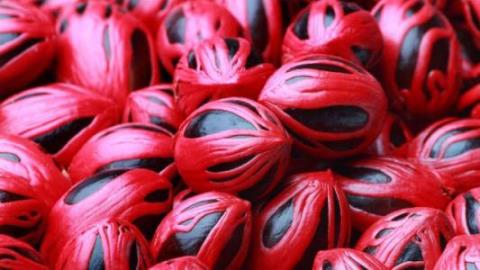
Nutmeg is a fragrant herb that warms the colon. Often used in cooking as a condiment, especially in stews. Nutmeg is also used to treat diarrhea, vomiting, digestive disorders, and sometimes used to enhance flavor for anorexia. This article will clarify the uses, usage and new research on Nutmeg.
content
- 1. Description of medicinal herbs
- 2. Harvesting and preparing
- 3. Chemical composition
- 4. Pharmacological effects
- 5. Uses, dosage
- 6. Experience prescription
1. Description of medicinal herbs
Nutmeg is also known as Nutmeg, Ngoc fruit. The scientific name is Myristica fragrans Houtt., belongs to the nutmeg family (Myristicaeae). The English name is Nutmeg.
The nutmeg tree gives us the following two medicines:
- Nutmeg (Semen Myristicae): The dried or dried kernel of the nutmeg seed.
- Pearl fruit , also known as Nutmeg y (Arillus Myristicae or Macis): Is the coat of dried or dried nutmeg seeds.
Both of these drugs have the same effect.
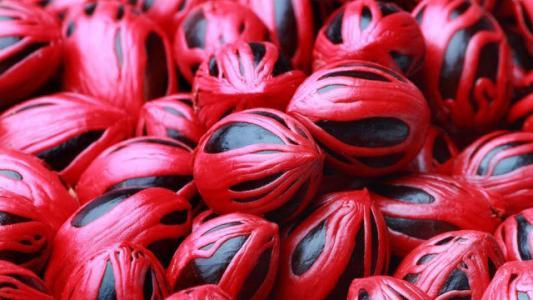
Nutmeg and seed coat
1.1. Nutmeg Tree
Nutmeg tree is big, 8-10m high. Whole body smooth. Leaves alternate, dark green, long petioles, broad lanceolate blade. White yellow flowers.
Berries, drooping, globose or pear-shaped, when ripe, open lengthwise into 2 pieces.
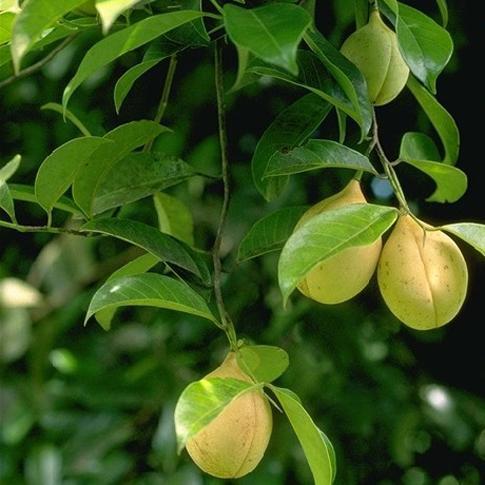
Nutmeg Branches and Fruits
Seeds have a thick, hard shell, covered by a torn, pink seed coat.
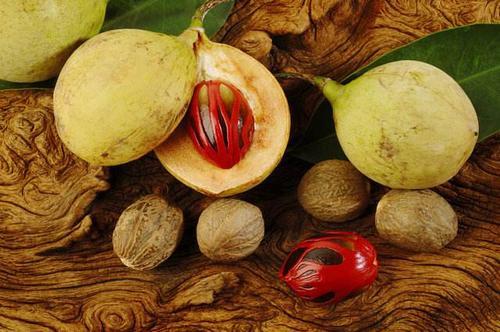
Nutmeg and its seeds
Nutmeg is grown in the South of Vietnam, Cambodia. Also grows in Indonesia, Malaysia and has been introduced to southern China, in Guangdong province.
1.2. Medicinal Nutmeg
Seeds ovate or oval , 2 cm to 3 cm long, 1.5 cm to 2.5 cm in diameter. Outer surface ash-brown or yellow-gray, sometimes powdery white, longitudinally grooved, faint, and irregularly reticulated. The navel at the obtuse end (umbilicus at the root of the germline) is a round, pale-colored protrusion. The substance is hard, the fracture surface has yellow-brown stone veins . Dry, oily, strong aroma , spicy taste.
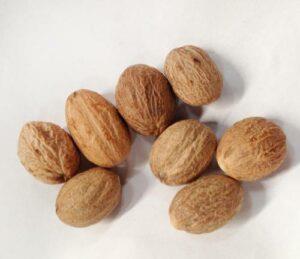
Nutmeg
2. Harvesting and preparing
2.1. Harvest
After 7 years of planting, the harvest begins. Fruit is harvested twice a year in the months of April - June and November - December. Can be harvested within 60-75 years.
After picking the fruit, peel off the shell, take the seed coat, soak it in water, and then dry it to get Nutmeg y.
Seeds are dried at a temperature of 60°C until there is a rattling sound, then smashed to get the kernel. Usually this drying takes up to 2 months. The kernels are classified into small and large and then soaked with lime water, then dried or dried again. The lime water soak is to prevent damage from termites.
2.2. Prepared
-
Raw nutmeg : Remove impurities, rinse, dry or air dry.
-
Reverse nutmeg ( guava Nutmeg ): Take flour and mix with the appropriate amount of water, add the nutmeg, stir well, pour into a coating or moisten the nutmeg in the pot, turn the pot and add the flour. Just spray the noodles with water and heat gently to create 3 to 4 layers of flour coating. Put the covered Nutmeg in a hot pan of sand or talc, until the flour is brown, sift off the sand or talc, remove the flour shell and let cool. Use 50 kg of talc for 100 kg of nutmeg.
- Dew nutmeg: Take the hot star seed kernel, squeeze out the oil, take the seeds to powder, wrap in paper and squeeze out the oil.
3. Chemical composition
Nutmeg contains 30 - 40% fat called Nutmeg Butter and about 5 - 10% essential oils. Mainly includes terpenes (α-pinene, camphene, p-cymene, sabinene, -phellandrene, -terpinene, myrcene), terpene derivatives (linalool, geraniol, terpineol) and phenylopropanes (myristicin, elmicin, safrole).
4. Pharmacological effects
- Various extracts and essential oils of the nutmeg seed presented potent antibacterial activity against gram-positive and gram-negative bacteria, as well as many fungi. Due to its high antioxidant and antibacterial activities, nutmeg can be considered a significant natural source of antioxidants and antimicrobial agents.
- Nutmeg showed significant protective activity in alcohol-induced gastric ulcers in experimental rats.
- Nutmeg extract improves sodium dextran sulfate-induced colitis in rats by inhibiting inflammatory cytokines.
- The toxicity of nutmeg is uncertain, although case reports suggest that if adequate doses are taken, acute toxicity can occur. Two tablespoons of nutmeg, one to three nutmeg or 5g of nutmeg powder can cause clinical signs of hallucinations, severe nausea.

Nutmeg seeds
5. Uses, dosage
5.1. Uses
Warms the intestines, stimulates digestion, stops vomiting, stops diarrhea.
Treatment: Long-term diarrhea with cold, abdominal bloating and watery stools, raw stool, abdominal distention and epigastric pain, anorexia, vomiting.
5.2. Dosage
Daily use from 3 g to 6 g, often in combination with other herbs.
6. Experience prescription
6.1. Anorexic
Used for anorexia, indigestion :
Nutmeg 0.5 g, Cinnamon 0.5 g, Clove 0.2 g finely ground mixed with lactose 1 g, divided into 3 packs, taken 3 times a day.
6.2. Digestive disorders
Treatment of digestive disorders, anorexia, vomiting, abdominal pain :
Ground nutmeg 100g, Ground Nutmeg 80g, Clove powdered 40g, Sandalwood powdered 30g, Calcium carbonate powder 250g, sugar 500g finely ground, mix well, use date 0.5 – 4 g.
>> You can also learn more about Anise: A medicine for the digestive tract , Incontinence of bowel movements: Hard to say!
6.3. Prolonged diarrhea
Long-term diarrhea due to chronic colitis or intestinal tuberculosis with cold abdomen, cold hands and feet, weakness, fatigue.
Supplement only 10-12g, Ngo thu du 9g, Ngu Vi Tu 10g, Party ginseng 15g, Nutmeg 6g (add later) excellent drink.
Or the song of the Four Gods : 10 g bone marrow, 5 g nutmeg (star), 5 g wu vizi 5 g, 4 g wu thu du 4 g, 3 big apple, 3 sharp slices of fresh ginger drink with light salt water before sleep.
In summary, Nutmeg has the effect of treating digestive disorders and used for anorexia.
The above information is for reference only. Ideally, you need to consult your doctor before using the herbs!